Business Ethics: Impact of Ethics on Business Development
VerifiedAdded on 2023/04/25
|9
|1505
|250
Report
AI Summary
This report provides a comprehensive overview of business ethics, examining both personal and group perspectives. It delves into ethical approaches, contrasting Kantianism and Utilitarianism, and their impact on decision-making. The report further explores social responsibilities, outlining the duties of leaders towards shareholders, employees, creditors, and society at large. It emphasizes the importance of ethical decision-making for organizational success, highlighting the influence of individual and structural ethics on outcomes. The report concludes by summarizing key concepts and providing a reference list of relevant academic sources.

Running head: Business Ethics
Business Ethics
Name of the Student:
Name of the University:
Author Note:
Business Ethics
Name of the Student:
Name of the University:
Author Note:
Paraphrase This Document
Need a fresh take? Get an instant paraphrase of this document with our AI Paraphraser
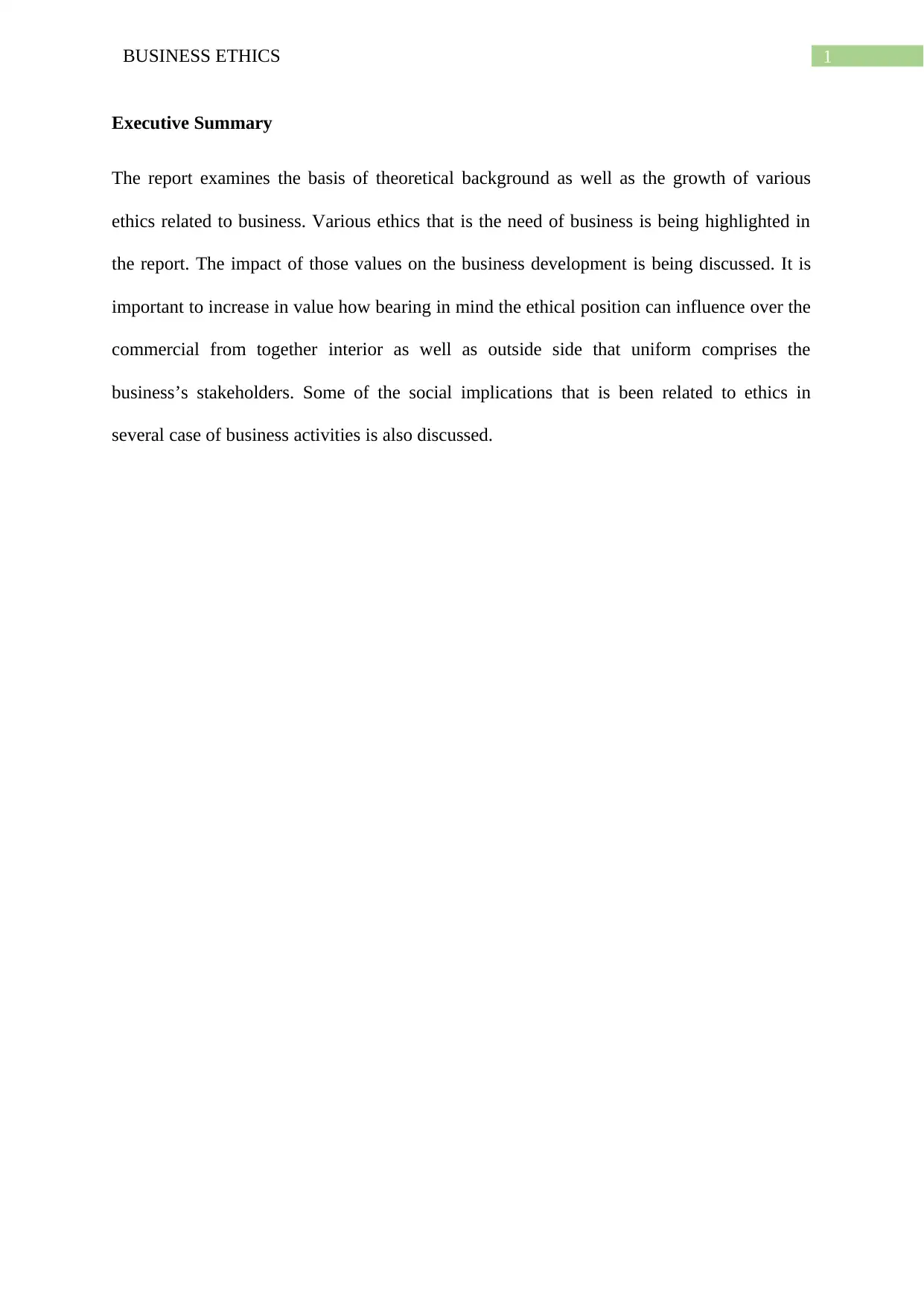
1BUSINESS ETHICS
Executive Summary
The report examines the basis of theoretical background as well as the growth of various
ethics related to business. Various ethics that is the need of business is being highlighted in
the report. The impact of those values on the business development is being discussed. It is
important to increase in value how bearing in mind the ethical position can influence over the
commercial from together interior as well as outside side that uniform comprises the
business’s stakeholders. Some of the social implications that is been related to ethics in
several case of business activities is also discussed.
Executive Summary
The report examines the basis of theoretical background as well as the growth of various
ethics related to business. Various ethics that is the need of business is being highlighted in
the report. The impact of those values on the business development is being discussed. It is
important to increase in value how bearing in mind the ethical position can influence over the
commercial from together interior as well as outside side that uniform comprises the
business’s stakeholders. Some of the social implications that is been related to ethics in
several case of business activities is also discussed.
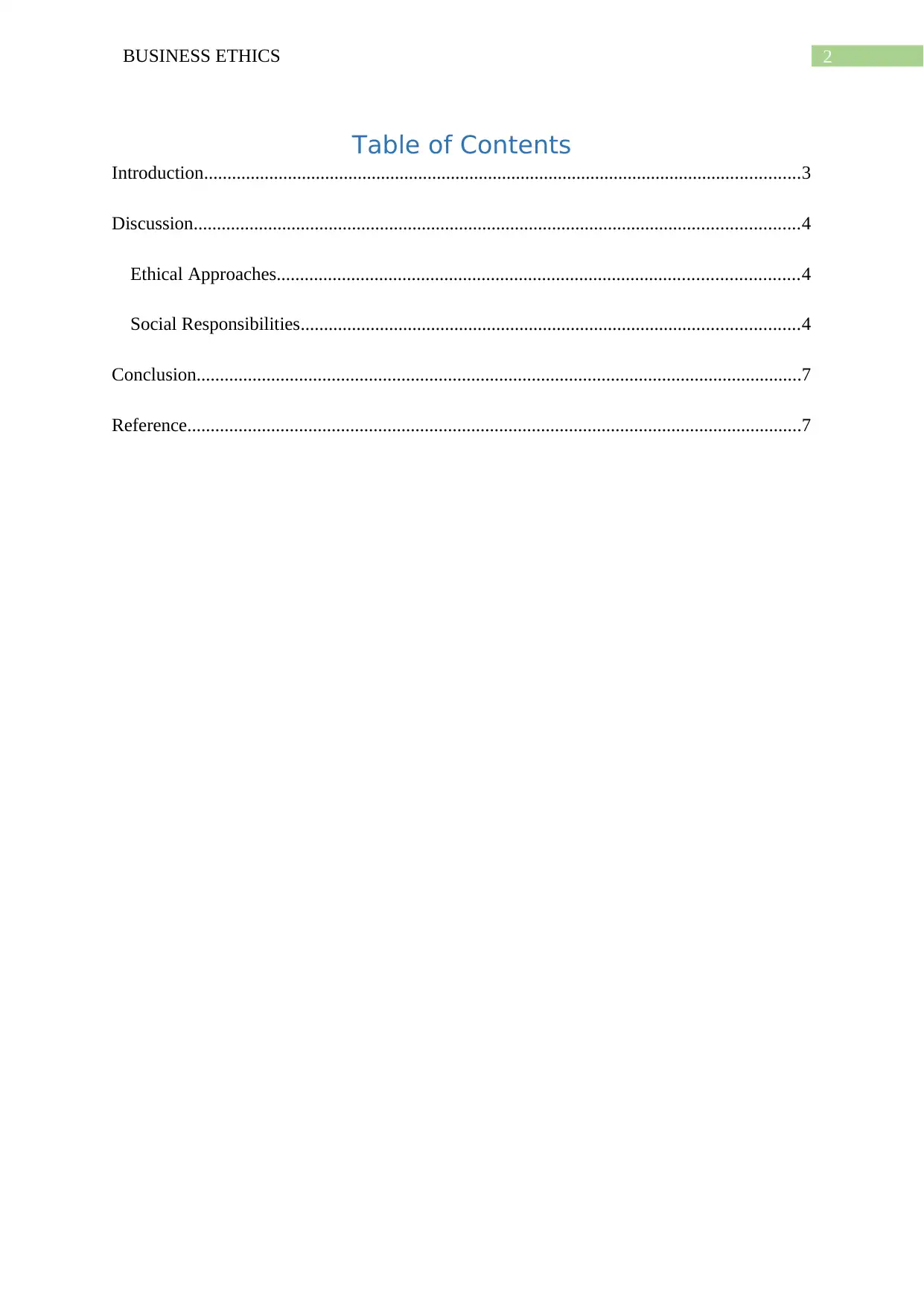
2BUSINESS ETHICS
Table of Contents
Introduction................................................................................................................................3
Discussion..................................................................................................................................4
Ethical Approaches................................................................................................................4
Social Responsibilities...........................................................................................................4
Conclusion..................................................................................................................................7
Reference....................................................................................................................................7
Table of Contents
Introduction................................................................................................................................3
Discussion..................................................................................................................................4
Ethical Approaches................................................................................................................4
Social Responsibilities...........................................................................................................4
Conclusion..................................................................................................................................7
Reference....................................................................................................................................7
⊘ This is a preview!⊘
Do you want full access?
Subscribe today to unlock all pages.

Trusted by 1+ million students worldwide
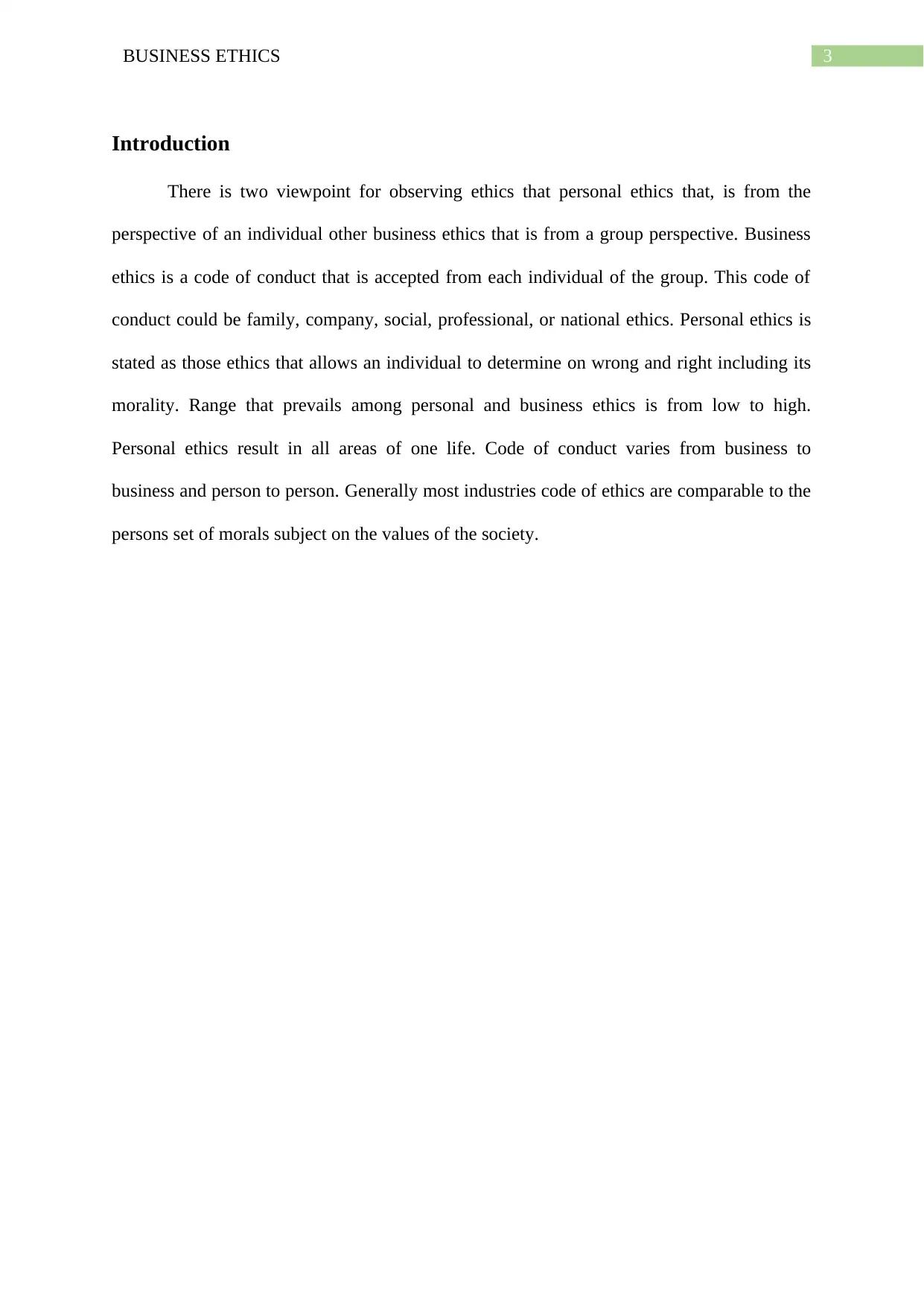
3BUSINESS ETHICS
Introduction
There is two viewpoint for observing ethics that personal ethics that, is from the
perspective of an individual other business ethics that is from a group perspective. Business
ethics is a code of conduct that is accepted from each individual of the group. This code of
conduct could be family, company, social, professional, or national ethics. Personal ethics is
stated as those ethics that allows an individual to determine on wrong and right including its
morality. Range that prevails among personal and business ethics is from low to high.
Personal ethics result in all areas of one life. Code of conduct varies from business to
business and person to person. Generally most industries code of ethics are comparable to the
persons set of morals subject on the values of the society.
Introduction
There is two viewpoint for observing ethics that personal ethics that, is from the
perspective of an individual other business ethics that is from a group perspective. Business
ethics is a code of conduct that is accepted from each individual of the group. This code of
conduct could be family, company, social, professional, or national ethics. Personal ethics is
stated as those ethics that allows an individual to determine on wrong and right including its
morality. Range that prevails among personal and business ethics is from low to high.
Personal ethics result in all areas of one life. Code of conduct varies from business to
business and person to person. Generally most industries code of ethics are comparable to the
persons set of morals subject on the values of the society.
Paraphrase This Document
Need a fresh take? Get an instant paraphrase of this document with our AI Paraphraser
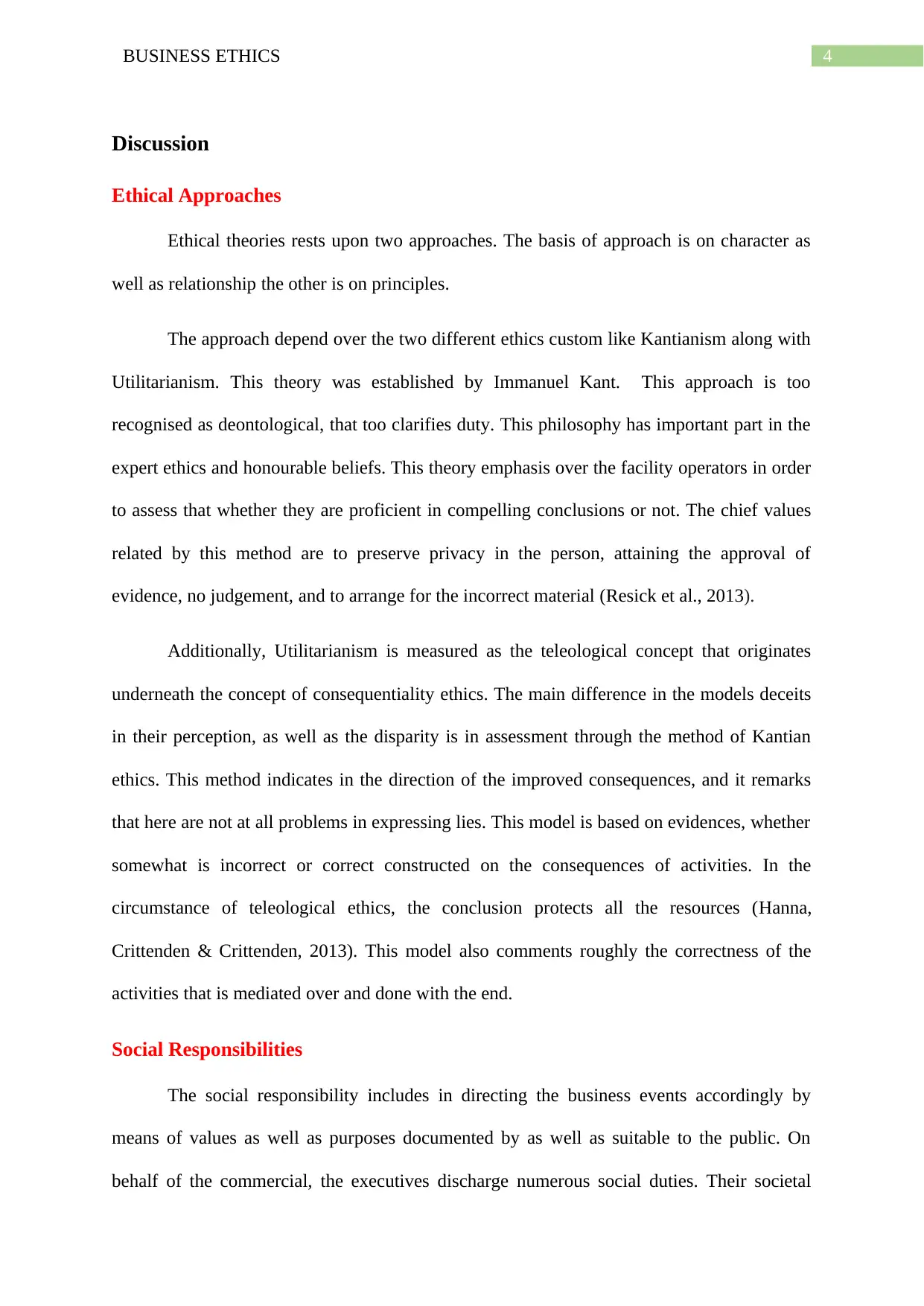
4BUSINESS ETHICS
Discussion
Ethical Approaches
Ethical theories rests upon two approaches. The basis of approach is on character as
well as relationship the other is on principles.
The approach depend over the two different ethics custom like Kantianism along with
Utilitarianism. This theory was established by Immanuel Kant. This approach is too
recognised as deontological, that too clarifies duty. This philosophy has important part in the
expert ethics and honourable beliefs. This theory emphasis over the facility operators in order
to assess that whether they are proficient in compelling conclusions or not. The chief values
related by this method are to preserve privacy in the person, attaining the approval of
evidence, no judgement, and to arrange for the incorrect material (Resick et al., 2013).
Additionally, Utilitarianism is measured as the teleological concept that originates
underneath the concept of consequentiality ethics. The main difference in the models deceits
in their perception, as well as the disparity is in assessment through the method of Kantian
ethics. This method indicates in the direction of the improved consequences, and it remarks
that here are not at all problems in expressing lies. This model is based on evidences, whether
somewhat is incorrect or correct constructed on the consequences of activities. In the
circumstance of teleological ethics, the conclusion protects all the resources (Hanna,
Crittenden & Crittenden, 2013). This model also comments roughly the correctness of the
activities that is mediated over and done with the end.
Social Responsibilities
The social responsibility includes in directing the business events accordingly by
means of values as well as purposes documented by as well as suitable to the public. On
behalf of the commercial, the executives discharge numerous social duties. Their societal
Discussion
Ethical Approaches
Ethical theories rests upon two approaches. The basis of approach is on character as
well as relationship the other is on principles.
The approach depend over the two different ethics custom like Kantianism along with
Utilitarianism. This theory was established by Immanuel Kant. This approach is too
recognised as deontological, that too clarifies duty. This philosophy has important part in the
expert ethics and honourable beliefs. This theory emphasis over the facility operators in order
to assess that whether they are proficient in compelling conclusions or not. The chief values
related by this method are to preserve privacy in the person, attaining the approval of
evidence, no judgement, and to arrange for the incorrect material (Resick et al., 2013).
Additionally, Utilitarianism is measured as the teleological concept that originates
underneath the concept of consequentiality ethics. The main difference in the models deceits
in their perception, as well as the disparity is in assessment through the method of Kantian
ethics. This method indicates in the direction of the improved consequences, and it remarks
that here are not at all problems in expressing lies. This model is based on evidences, whether
somewhat is incorrect or correct constructed on the consequences of activities. In the
circumstance of teleological ethics, the conclusion protects all the resources (Hanna,
Crittenden & Crittenden, 2013). This model also comments roughly the correctness of the
activities that is mediated over and done with the end.
Social Responsibilities
The social responsibility includes in directing the business events accordingly by
means of values as well as purposes documented by as well as suitable to the public. On
behalf of the commercial, the executives discharge numerous social duties. Their societal
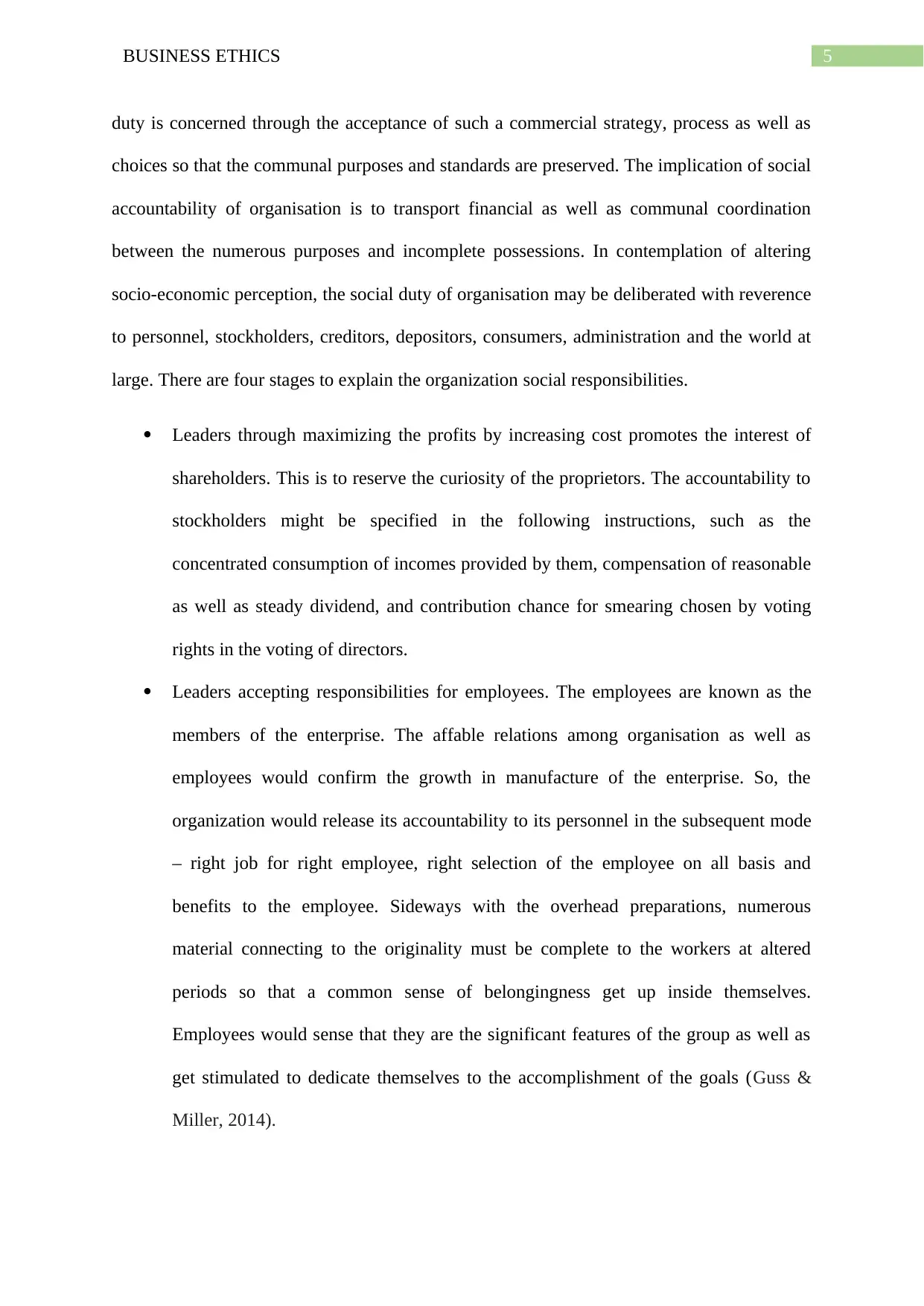
5BUSINESS ETHICS
duty is concerned through the acceptance of such a commercial strategy, process as well as
choices so that the communal purposes and standards are preserved. The implication of social
accountability of organisation is to transport financial as well as communal coordination
between the numerous purposes and incomplete possessions. In contemplation of altering
socio-economic perception, the social duty of organisation may be deliberated with reverence
to personnel, stockholders, creditors, depositors, consumers, administration and the world at
large. There are four stages to explain the organization social responsibilities.
Leaders through maximizing the profits by increasing cost promotes the interest of
shareholders. This is to reserve the curiosity of the proprietors. The accountability to
stockholders might be specified in the following instructions, such as the
concentrated consumption of incomes provided by them, compensation of reasonable
as well as steady dividend, and contribution chance for smearing chosen by voting
rights in the voting of directors.
Leaders accepting responsibilities for employees. The employees are known as the
members of the enterprise. The affable relations among organisation as well as
employees would confirm the growth in manufacture of the enterprise. So, the
organization would release its accountability to its personnel in the subsequent mode
– right job for right employee, right selection of the employee on all basis and
benefits to the employee. Sideways with the overhead preparations, numerous
material connecting to the originality must be complete to the workers at altered
periods so that a common sense of belongingness get up inside themselves.
Employees would sense that they are the significant features of the group as well as
get stimulated to dedicate themselves to the accomplishment of the goals (Guss &
Miller, 2014).
duty is concerned through the acceptance of such a commercial strategy, process as well as
choices so that the communal purposes and standards are preserved. The implication of social
accountability of organisation is to transport financial as well as communal coordination
between the numerous purposes and incomplete possessions. In contemplation of altering
socio-economic perception, the social duty of organisation may be deliberated with reverence
to personnel, stockholders, creditors, depositors, consumers, administration and the world at
large. There are four stages to explain the organization social responsibilities.
Leaders through maximizing the profits by increasing cost promotes the interest of
shareholders. This is to reserve the curiosity of the proprietors. The accountability to
stockholders might be specified in the following instructions, such as the
concentrated consumption of incomes provided by them, compensation of reasonable
as well as steady dividend, and contribution chance for smearing chosen by voting
rights in the voting of directors.
Leaders accepting responsibilities for employees. The employees are known as the
members of the enterprise. The affable relations among organisation as well as
employees would confirm the growth in manufacture of the enterprise. So, the
organization would release its accountability to its personnel in the subsequent mode
– right job for right employee, right selection of the employee on all basis and
benefits to the employee. Sideways with the overhead preparations, numerous
material connecting to the originality must be complete to the workers at altered
periods so that a common sense of belongingness get up inside themselves.
Employees would sense that they are the significant features of the group as well as
get stimulated to dedicate themselves to the accomplishment of the goals (Guss &
Miller, 2014).
⊘ This is a preview!⊘
Do you want full access?
Subscribe today to unlock all pages.

Trusted by 1+ million students worldwide
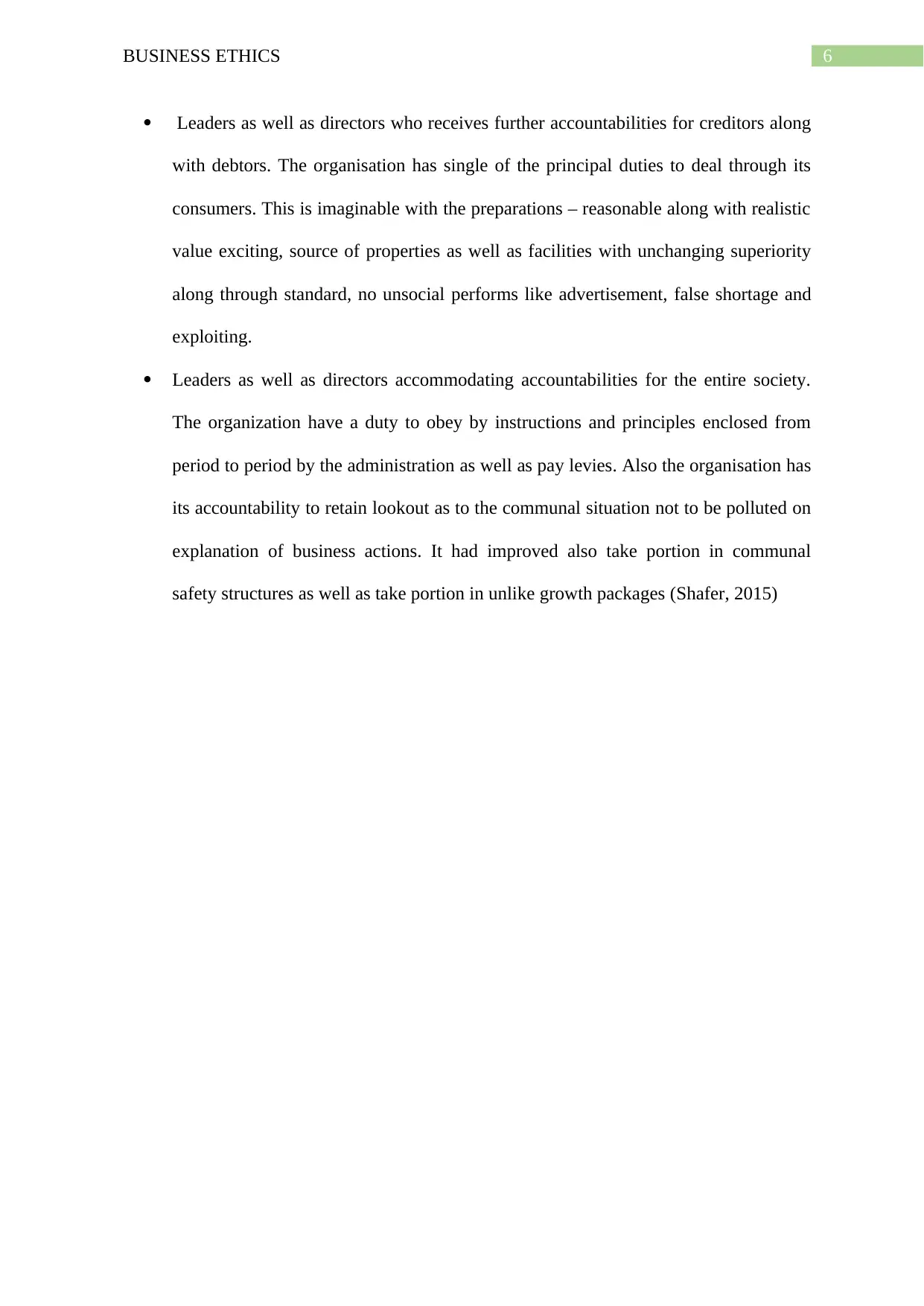
6BUSINESS ETHICS
Leaders as well as directors who receives further accountabilities for creditors along
with debtors. The organisation has single of the principal duties to deal through its
consumers. This is imaginable with the preparations – reasonable along with realistic
value exciting, source of properties as well as facilities with unchanging superiority
along through standard, no unsocial performs like advertisement, false shortage and
exploiting.
Leaders as well as directors accommodating accountabilities for the entire society.
The organization have a duty to obey by instructions and principles enclosed from
period to period by the administration as well as pay levies. Also the organisation has
its accountability to retain lookout as to the communal situation not to be polluted on
explanation of business actions. It had improved also take portion in communal
safety structures as well as take portion in unlike growth packages (Shafer, 2015)
Leaders as well as directors who receives further accountabilities for creditors along
with debtors. The organisation has single of the principal duties to deal through its
consumers. This is imaginable with the preparations – reasonable along with realistic
value exciting, source of properties as well as facilities with unchanging superiority
along through standard, no unsocial performs like advertisement, false shortage and
exploiting.
Leaders as well as directors accommodating accountabilities for the entire society.
The organization have a duty to obey by instructions and principles enclosed from
period to period by the administration as well as pay levies. Also the organisation has
its accountability to retain lookout as to the communal situation not to be polluted on
explanation of business actions. It had improved also take portion in communal
safety structures as well as take portion in unlike growth packages (Shafer, 2015)
Paraphrase This Document
Need a fresh take? Get an instant paraphrase of this document with our AI Paraphraser
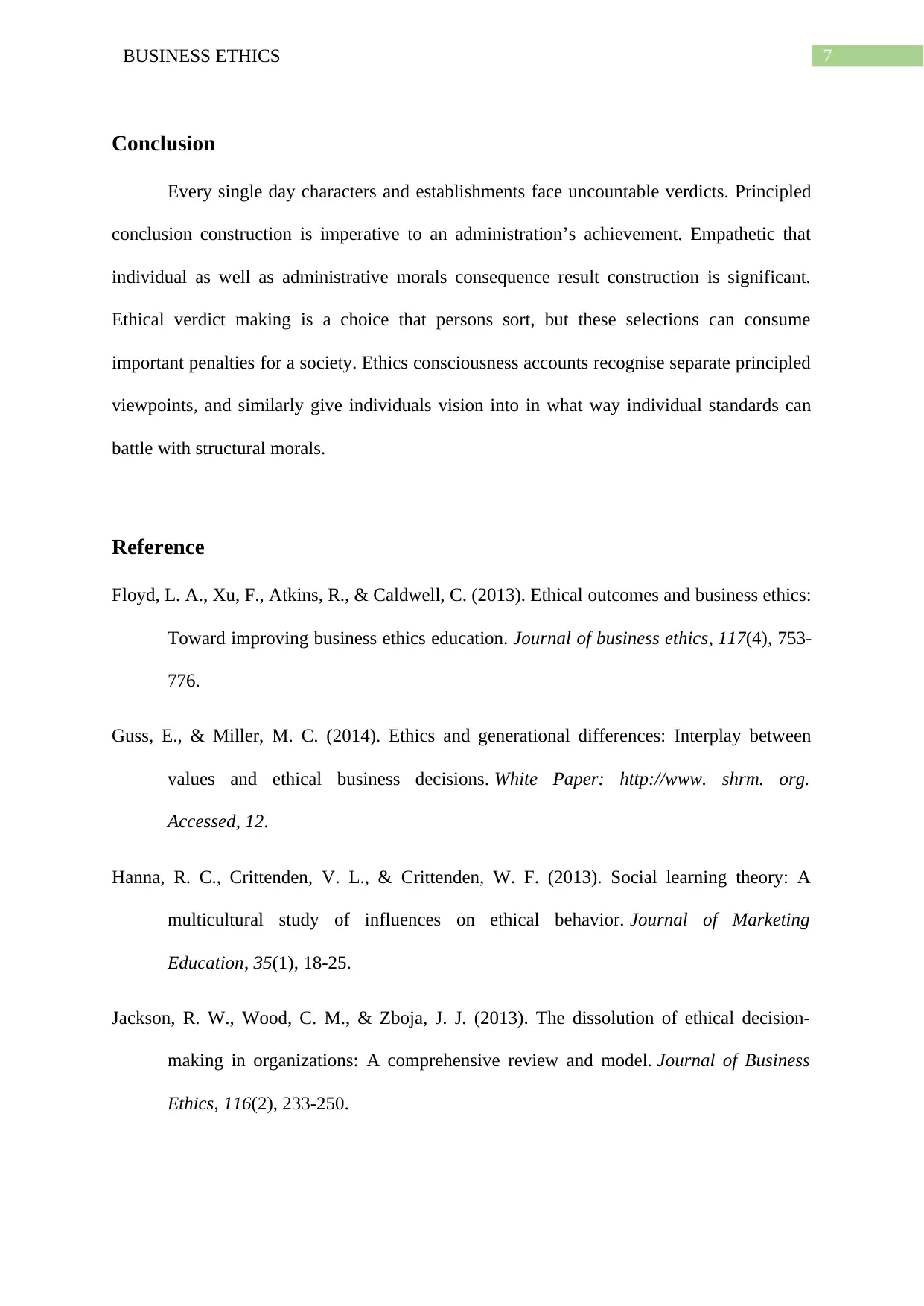
7BUSINESS ETHICS
Conclusion
Every single day characters and establishments face uncountable verdicts. Principled
conclusion construction is imperative to an administration’s achievement. Empathetic that
individual as well as administrative morals consequence result construction is significant.
Ethical verdict making is a choice that persons sort, but these selections can consume
important penalties for a society. Ethics consciousness accounts recognise separate principled
viewpoints, and similarly give individuals vision into in what way individual standards can
battle with structural morals.
Reference
Floyd, L. A., Xu, F., Atkins, R., & Caldwell, C. (2013). Ethical outcomes and business ethics:
Toward improving business ethics education. Journal of business ethics, 117(4), 753-
776.
Guss, E., & Miller, M. C. (2014). Ethics and generational differences: Interplay between
values and ethical business decisions. White Paper: http://www. shrm. org.
Accessed, 12.
Hanna, R. C., Crittenden, V. L., & Crittenden, W. F. (2013). Social learning theory: A
multicultural study of influences on ethical behavior. Journal of Marketing
Education, 35(1), 18-25.
Jackson, R. W., Wood, C. M., & Zboja, J. J. (2013). The dissolution of ethical decision-
making in organizations: A comprehensive review and model. Journal of Business
Ethics, 116(2), 233-250.
Conclusion
Every single day characters and establishments face uncountable verdicts. Principled
conclusion construction is imperative to an administration’s achievement. Empathetic that
individual as well as administrative morals consequence result construction is significant.
Ethical verdict making is a choice that persons sort, but these selections can consume
important penalties for a society. Ethics consciousness accounts recognise separate principled
viewpoints, and similarly give individuals vision into in what way individual standards can
battle with structural morals.
Reference
Floyd, L. A., Xu, F., Atkins, R., & Caldwell, C. (2013). Ethical outcomes and business ethics:
Toward improving business ethics education. Journal of business ethics, 117(4), 753-
776.
Guss, E., & Miller, M. C. (2014). Ethics and generational differences: Interplay between
values and ethical business decisions. White Paper: http://www. shrm. org.
Accessed, 12.
Hanna, R. C., Crittenden, V. L., & Crittenden, W. F. (2013). Social learning theory: A
multicultural study of influences on ethical behavior. Journal of Marketing
Education, 35(1), 18-25.
Jackson, R. W., Wood, C. M., & Zboja, J. J. (2013). The dissolution of ethical decision-
making in organizations: A comprehensive review and model. Journal of Business
Ethics, 116(2), 233-250.
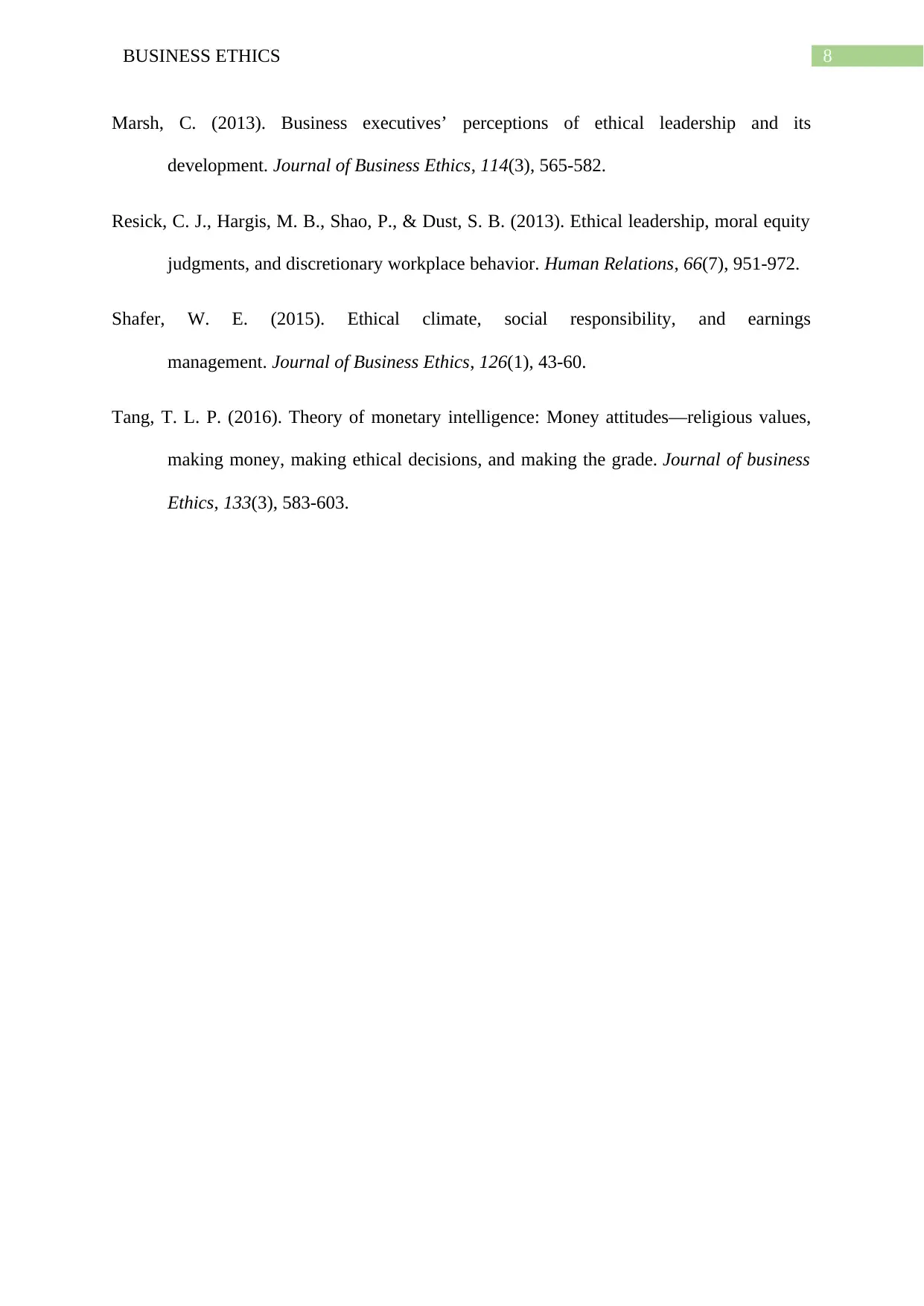
8BUSINESS ETHICS
Marsh, C. (2013). Business executives’ perceptions of ethical leadership and its
development. Journal of Business Ethics, 114(3), 565-582.
Resick, C. J., Hargis, M. B., Shao, P., & Dust, S. B. (2013). Ethical leadership, moral equity
judgments, and discretionary workplace behavior. Human Relations, 66(7), 951-972.
Shafer, W. E. (2015). Ethical climate, social responsibility, and earnings
management. Journal of Business Ethics, 126(1), 43-60.
Tang, T. L. P. (2016). Theory of monetary intelligence: Money attitudes—religious values,
making money, making ethical decisions, and making the grade. Journal of business
Ethics, 133(3), 583-603.
Marsh, C. (2013). Business executives’ perceptions of ethical leadership and its
development. Journal of Business Ethics, 114(3), 565-582.
Resick, C. J., Hargis, M. B., Shao, P., & Dust, S. B. (2013). Ethical leadership, moral equity
judgments, and discretionary workplace behavior. Human Relations, 66(7), 951-972.
Shafer, W. E. (2015). Ethical climate, social responsibility, and earnings
management. Journal of Business Ethics, 126(1), 43-60.
Tang, T. L. P. (2016). Theory of monetary intelligence: Money attitudes—religious values,
making money, making ethical decisions, and making the grade. Journal of business
Ethics, 133(3), 583-603.
⊘ This is a preview!⊘
Do you want full access?
Subscribe today to unlock all pages.

Trusted by 1+ million students worldwide
1 out of 9
Related Documents
Your All-in-One AI-Powered Toolkit for Academic Success.
+13062052269
info@desklib.com
Available 24*7 on WhatsApp / Email
![[object Object]](/_next/static/media/star-bottom.7253800d.svg)
Unlock your academic potential
Copyright © 2020–2026 A2Z Services. All Rights Reserved. Developed and managed by ZUCOL.





